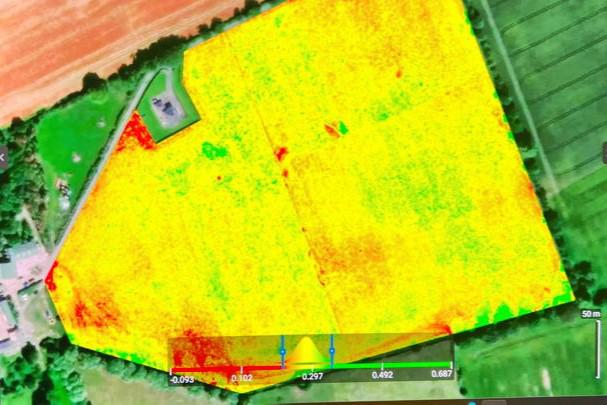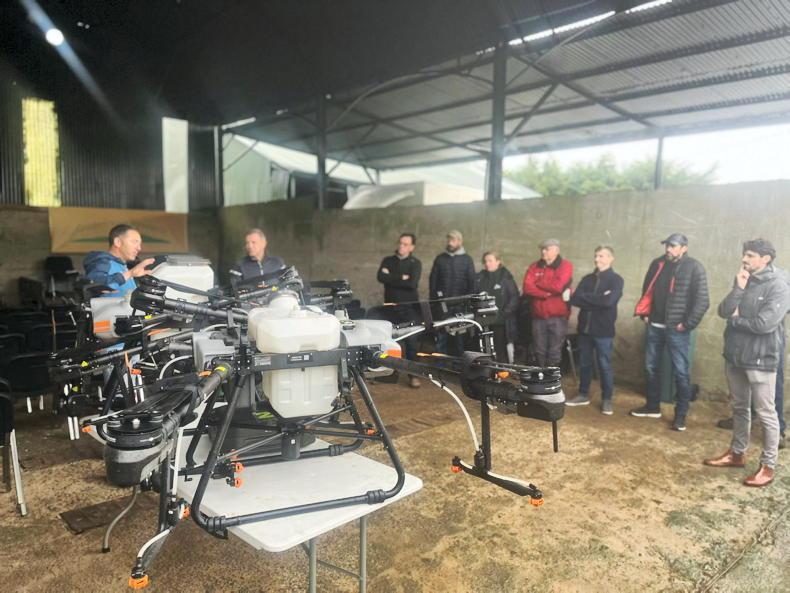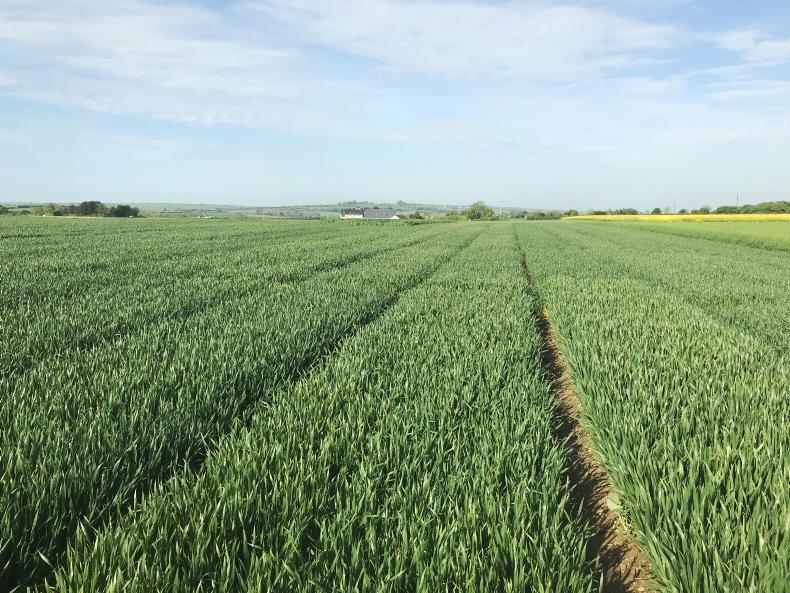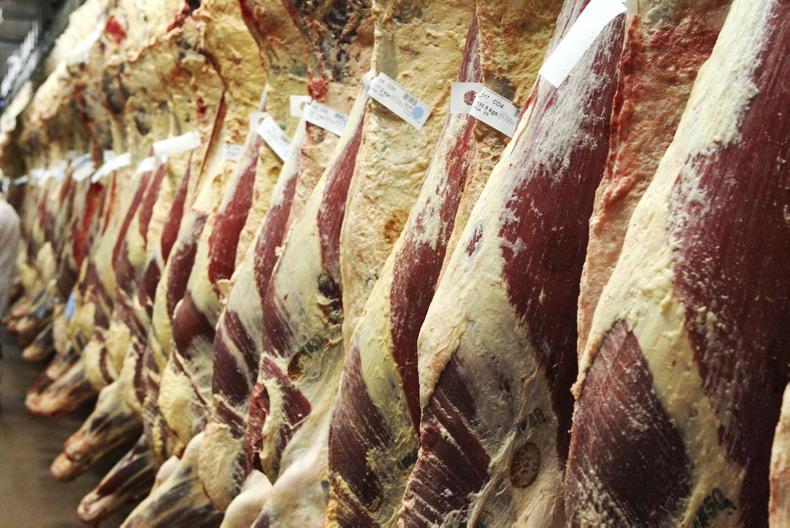Last month a demonstration day focused on showcasing how drones can work in agriculture took place in Tipperary. The Irish Farmers Journal spoke to Nicholas Ryan of Golden Vale Research who organised the day on his farm.
He explained that he had seen how drones are used in agriculture in the US and Australia and could see their potential for use in Ireland to help save time, labour, and inputs.

The scanned image of the field, showing areas in red with low grass coverage.
Given that drone use in Ireland is limited and quite restricted, he decided to hold an open day and partner with Aerial AG Ireland to demonstrate how the technology could work in Ireland and initiate a conversation around its use.
The event was held in October and, despite poor weather, farmers, agronomists, contractors, students, technicians, and foresters travelled to Tipperary to attend.
What was on show
Dublin-based Aerial AG Ireland displayed a number of their agricultural drones on the day. This included their DJI Mavic 3 drone, equipped with a high-resolution camera and multispectral sensor which can capture detailed aerial imagery.
The imagery is used to give farmers insight into crop health, growth patterns and potential issues.
A recently grazed field on the farm was scanned by the drone and the results shown to attendees.
Nicholas explained that the drone flew over the field 10 days earlier and showed the areas where grass growth was reduced.

Nicolas Ryan Golden Vale Research
The DJI AGRAS T30 was on display at the event which is capable of spraying up to 40ac per hour. The drone can be used in combination with the DJI Mavic 3 and sensor, to target specific areas to be treated.
Next steps
Nicholas explained that they intend to carry out further trials using drones on crops and will hold another open day next year. On his farm, he plans to grow a 48ac field of spring barley which will in part be managed conventionally, while the rest will be managed using a drone. This means fertilisation will be done with the drone, allowing him to compare the two crops as a trial. The results will be seen next year.

The DJI spraying drone on display at the event.
Nicholas explained that he envisions drones being used on farms in the future, either as a contracting service or with farmers owning them themselves.Regulations will need to be updated, and farmers will need to secure a licence he said.
However, while an agricultural drone may cost upwards of €30,000, this pales in comparison to the cost of a new sprayer, so he can see a future in it. He said he would like to see drones included in the TAMS (Targeted Agricultural Modernisation Scheme) in the near future.
Last month a demonstration day focused on showcasing how drones can work in agriculture took place in Tipperary. The Irish Farmers Journal spoke to Nicholas Ryan of Golden Vale Research who organised the day on his farm.
He explained that he had seen how drones are used in agriculture in the US and Australia and could see their potential for use in Ireland to help save time, labour, and inputs.

The scanned image of the field, showing areas in red with low grass coverage.
Given that drone use in Ireland is limited and quite restricted, he decided to hold an open day and partner with Aerial AG Ireland to demonstrate how the technology could work in Ireland and initiate a conversation around its use.
The event was held in October and, despite poor weather, farmers, agronomists, contractors, students, technicians, and foresters travelled to Tipperary to attend.
What was on show
Dublin-based Aerial AG Ireland displayed a number of their agricultural drones on the day. This included their DJI Mavic 3 drone, equipped with a high-resolution camera and multispectral sensor which can capture detailed aerial imagery.
The imagery is used to give farmers insight into crop health, growth patterns and potential issues.
A recently grazed field on the farm was scanned by the drone and the results shown to attendees.
Nicholas explained that the drone flew over the field 10 days earlier and showed the areas where grass growth was reduced.

Nicolas Ryan Golden Vale Research
The DJI AGRAS T30 was on display at the event which is capable of spraying up to 40ac per hour. The drone can be used in combination with the DJI Mavic 3 and sensor, to target specific areas to be treated.
Next steps
Nicholas explained that they intend to carry out further trials using drones on crops and will hold another open day next year. On his farm, he plans to grow a 48ac field of spring barley which will in part be managed conventionally, while the rest will be managed using a drone. This means fertilisation will be done with the drone, allowing him to compare the two crops as a trial. The results will be seen next year.

The DJI spraying drone on display at the event.
Nicholas explained that he envisions drones being used on farms in the future, either as a contracting service or with farmers owning them themselves.Regulations will need to be updated, and farmers will need to secure a licence he said.
However, while an agricultural drone may cost upwards of €30,000, this pales in comparison to the cost of a new sprayer, so he can see a future in it. He said he would like to see drones included in the TAMS (Targeted Agricultural Modernisation Scheme) in the near future.













SHARING OPTIONS